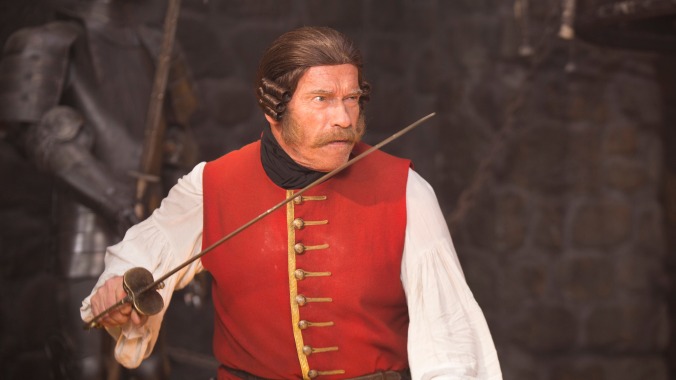There are two new Jackie Chan movies out today, but only one is dumb and fun

There’s no reason why a movie that features Jackie Chan, lion attacks, and machete-wielding henchmen on Jet Skis should be as boring as Vanguard. Yet this charmless offering from Stanley Tong (who once upon a time directed Police Story 3: Supercop and Rumble In The Bronx) manages to bring together the least winning qualities of recent Chinese multiplex schlock. If the films for which Tong is remembered were cartoonish, this one is half literal cartoon: a slurry of luxury vehicles flying and crashing through globetrotting background footage, with ugly textures and poor physics that place the proceedings well into the automotive equivalent of the uncanny valley.
Whether it is actually a Jackie Chan film is questionable. The aging Hong Kong star definitely appears in many scenes as Tang, the head of Vanguard, an elite London-based security firm. And he is in fact visible in one of the chase sequences (this one involving an amphibious Jeep and the aforementioned henchmen on Jet Skis), throwing less-than-convincing, love-tap punches at various thugs. But for the most part, he’s here to bless the visual noise with his uncharacteristically sedate presence and to read out loud the yadda-yadda plot, which concerns a shady ex-arms-dealer client whose daughter (Xu Ruohan) must be protected from nefarious groups called the Arctic Wolves and the Brotherhood of Vengeance and a bad guy named Borto (stuntman Brahmin Chab). The rest is carried by negligible personalities with boy band hair, played by the likes of Yang Yang and Ai Lun.
Vanguard is technically action-filled, in that it is full of what is loosely termed “action”: explosions, car crashes, set pieces that involve the shopping districts of various cities, and even a shootout with a hoverboard. But the move from practical stuns to a discount VFX simulacrum (no real cars appear to have been wrecked in any of these chase scenes) has not flattered Tong’s amateurish direction. It doesn’t help that the movie plays like a cheap copy of the last Tong-Chan joint, Kung Fu Yoga, right down to the CGI animal antics and eventual relocation to Dubai. That movie already felt like a knock-off of a dozen different films (including Tong’s earlier Chan vehicle The Myth, to which it was a quasi-reboot).
This kind of hyper-derivative multiple personality syndrome is as common among pre-sales-based international products as franchise-itis is among Hollywood blockbusters. But it does sometimes lead to wackadoodle results, as in the case of Oleg Stepchenko’s Russian-Chinese coproduction Iron Mask, in which Chan also puts in an appearance alongside Arnold Schwarzenegger and, in a blink-and-you’ll-miss-it cameo, the late Rutger Hauer. Given that both films are being released on the same day, Stepchenko’s bizarre 18th-century-set fantasy is the superior choice, in part because Charles Dance-narrated gobbledygook about wizards, tea, and “the great dragon’s eyelashes” is obviously preferable to inanities about weapons of mass destruction.
Although it isn’t actually a comedy, Iron Mask qualifies, in substantial stretches, as one of the funniest films of the year. The first 15 minutes abound in goofy delights: bad dubbing, convoluted expository narration, clunky English-language dialogue. The last is also plentiful in Vanguard, but it doesn’t come close to the dazzling heights of “This shall be my final letter to you, as I only have a single pigeon left” and “I’m not just a teacher! I’m a bachelor of geography and cartography!” This is what separates delectable garbage from mere junk. It’s only in the former category that one can find Schwarzenegger, wearing a mustache, wig, and tricorn hat in the role of an English dungeon keeper, yelling, “Where would you go? It’s the Towaaah!”
Of course, to a certain kind of trash fanatic, a film with multiple misleading alternate titles is inherently irresistible; this one has already been released in various territories as The Dragon Seal, The Mystery Of The Dragon Seal, and Viy 2: Journey To China. In theory, it’s a sequel to Stepchenko’s Russian blockbuster Viy, which bore only a loose relationship to the classic Nikolai Gogol story of the same title. (To approximate the dissonance between literary source material and end product, just imagine that Iron Mask is called The Cask Of Amontillado 2: Mission To Moscow.) The previous film’s protagonist, the English mapmaker and inventor Jonathan Green (Jason Flemyng), returns, though he’s mostly extraneous to an incomprehensible plot that Stepchenko tries to wrangle in a broad style inspired by professional Johnny Depp minders like Gore Verbinski and Tim Burton.
Said plot involves Peter The Great (Yuri Kolokolnikov), who is being kept prisoner in a tower in London (which isn’t the Tower Of London) alongside a Chinese martial arts master (Chan, with long white hair and a beard) while an impostor sits on his throne. This does eventually lead to a showdown between Chan’s jailed sage and Schwarzenegger’s antiques-collecting warden, and though it’s a shame that we’ve had to wait until both action stars were well into the AARP demographic for an Arnie versus Jackie slugfest, Stepchenko has the sense to build the scene around their comic timing. In fact, at least two-thirds of Iron Mask is funny on purpose. The rest, however, is eventually dragged down by compounding inertia.
Winged imps, gender-bending disguises, and a second royal impostor storyline are thrown into the mix, until the film decides that what it really wants to be is a bog-standard Chinese fantasy film, shunting off its endearingly bizarre subplots to a potential sequel. The spectacle of witches and dragons is not one of Iron Mask’s strengths; the film is simply better as a messy co-production smorgasbord. Nonetheless, in our exhausting, dispiriting times, anything that wears out its welcome with such ludicrous pizzazz feels like a tonic.